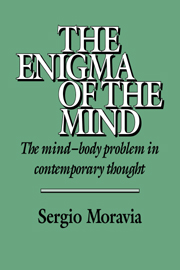Book contents
- Frontmatter
- Contents
- Preface to the English edition
- The enigma of the mind
- The enigma of the mind: Introduction to a metaphor
- 1 Toward a physical science of the mental: Feigl and the (re-)construction of the ‘mind–body problem’
- 2 The apogee of physicalism: The identity theory and materialism in the Australian school
- 3 The obscure relationship: Problems and debates surrounding the identity theory
- 4 Psychology as alchemy: The elimination of the mental in the ‘disappearance theory’
- 5 The mind as function: The functionalist approach to the mind–body problem
- 6 The mind as property and as event: The ‘reformist’ neo-identityism of Kim and Davidson
- 7 The mind as language: The linguistic turn in the mind–body problem
- 8 Speaking in many different ways: The pluralization of descriptions and explanations in the MBP
- 9 The mind as a mode of subjective experience: An interpretive model of the features of the mental
- 10 The mind as ‘subject’ and as ‘being-in-the-world’: Toward a non-mentalistic interpretation of the mental
- Appendix The mental as intentional/‘personal’ emergence: The psycho-personological perspective of Joseph Margolis
- Bibliography
- Name index
8 - Speaking in many different ways: The pluralization of descriptions and explanations in the MBP
Published online by Cambridge University Press: 05 June 2012
- Frontmatter
- Contents
- Preface to the English edition
- The enigma of the mind
- The enigma of the mind: Introduction to a metaphor
- 1 Toward a physical science of the mental: Feigl and the (re-)construction of the ‘mind–body problem’
- 2 The apogee of physicalism: The identity theory and materialism in the Australian school
- 3 The obscure relationship: Problems and debates surrounding the identity theory
- 4 Psychology as alchemy: The elimination of the mental in the ‘disappearance theory’
- 5 The mind as function: The functionalist approach to the mind–body problem
- 6 The mind as property and as event: The ‘reformist’ neo-identityism of Kim and Davidson
- 7 The mind as language: The linguistic turn in the mind–body problem
- 8 Speaking in many different ways: The pluralization of descriptions and explanations in the MBP
- 9 The mind as a mode of subjective experience: An interpretive model of the features of the mental
- 10 The mind as ‘subject’ and as ‘being-in-the-world’: Toward a non-mentalistic interpretation of the mental
- Appendix The mental as intentional/‘personal’ emergence: The psycho-personological perspective of Joseph Margolis
- Bibliography
- Name index
Summary
THE PLURALITY OF DESCRIPTIONS AND EXPLANATIONS IN THE ANALYSIS OF THE MENTAL
The ‘linguistic turn’ produced many significant consequences in the debate on the mbp. One of the most important is the conviction that psychophysical phenomena can, and must, be given different descriptions and explanations. Ryle had argued explicitly for the rejection of notion of knowledge founded on a single type of explanatory procedure. As regards human phenomena, we read in The Concept of Mind, two equally legitimate kinds of question may arise: those concerning “rules” and those concerning “choices”. When we observe a chess match, for example, we may ask ourselves why a particular bishop always ends up on a square of the same color, or why a player has moved his bishop in a particular way (Ryle 1949, p. 75). In the first case the question concerns the norms that objectively govern a certain system; in the second, the behavioral acts subjectively and decisionally performed by certain agents. Ryle also distinguishes two fundamental classes of explanatory models: those relative to “causes” and those relative to “reasons”. Explanations by causes tend to identify the natural, general presuppositions underlying certain actions (as well as, obviously, the causes of phenomena that are not actions); explanations by reasons tend to identify the teleological, particular motives (and in certain cases the conscious, cultural motives) of the agents of those actions (ibid., pp. 86, 109, 305).
Information
- Type
- Chapter
- Information
- The Enigma of the MindThe Mind-Body Problem in Contemporary Thought, pp. 195 - 205Publisher: Cambridge University PressPrint publication year: 1995
